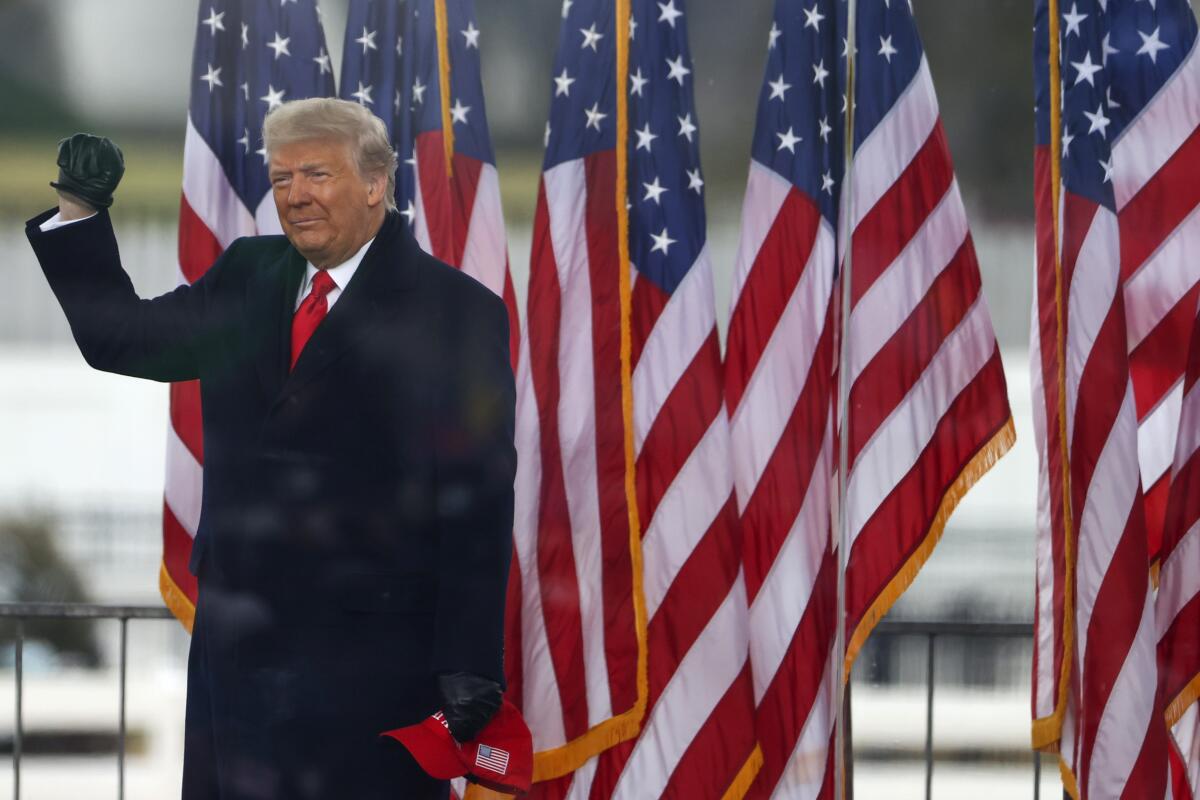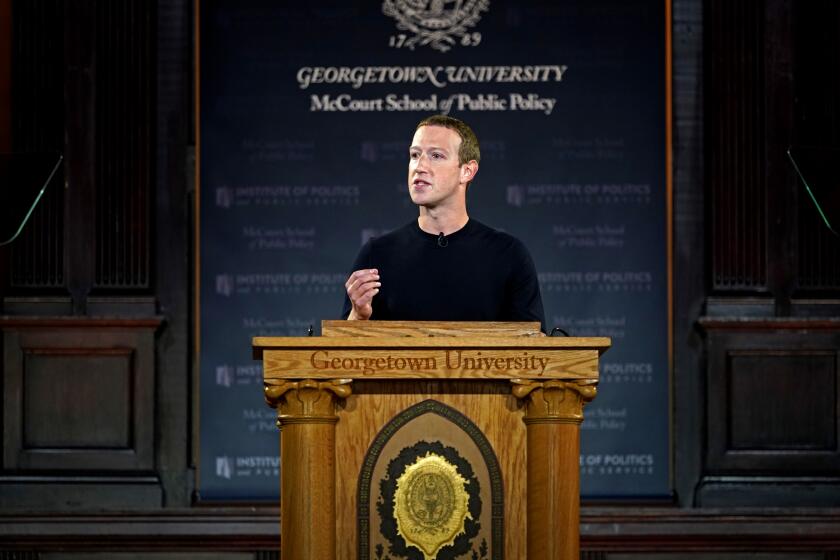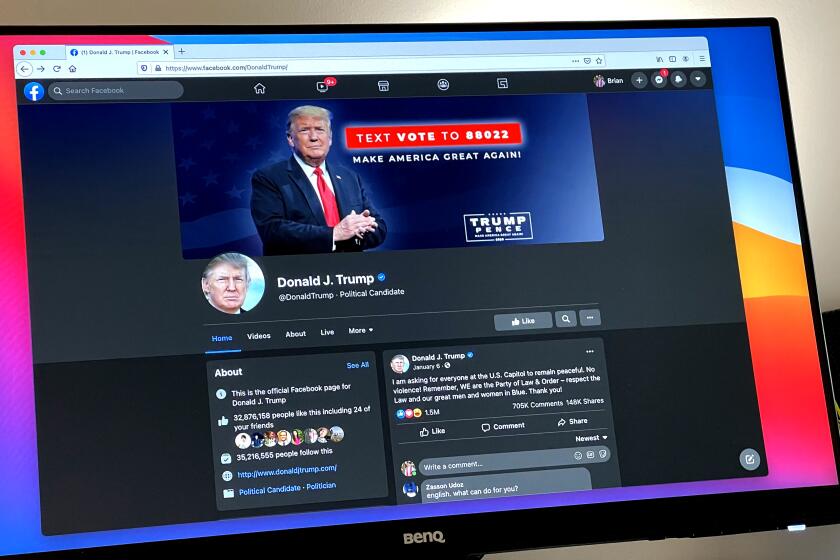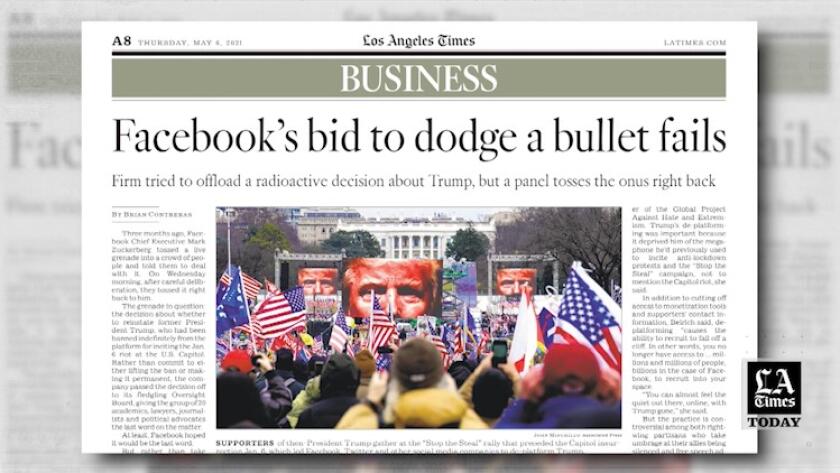Facebook board upholds Trump exile, sends final decision back to company

- Share via
Three months ago, Facebook Chief Executive Mark Zuckerberg tossed a live grenade into a crowd of people and told them to deal with it. On Wednesday morning, after careful deliberation, they tossed it right back to him.
The grenade in question: the decision about whether to reinstate former President Trump, who had been banned indefinitely from the platform for inciting the Jan. 6 riot at the U.S. Capitol. Rather than commit to either lifting the ban or making it permanent, the company passed the decision off to its fledgling Oversight Board, giving the group of 20 academics, lawyers, journalists and political advocates the last word on the matter.
At least, Facebook hoped it would be the last word.
But rather than take ownership of what was destined to be a momentous and unpopular call whichever way it went, the board essentially referred the matter back to Facebook, with some new homework and a deadline appended.
In a statement, the organization said freezing Trump’s account after the insurrection was the right response but it was “not appropriate for Facebook to impose the indeterminate and standardless penalty of indefinite suspension.” In keeping with “the rules that are applied to other users,” it could end the suspension, or make it permanent, or even end it and immediately renew it — but it must do one of those things within six months and be able to explain it in policy terms.
The ruling returns both Trump and Zuckerberg to exactly where they were in early January — one uncertain whether he’ll ever regain his cherished social media megaphones, the other staring down a dilemma he had looked to bypass. Its resolution, whenever it finally arrives, promises to send wider ripples through Silicon Valley, giving Twitter, Snapchat and other platforms cover to maintain their own bans or impose new ones.
Neither tech company CEOs nor politicians want to make the tough calls on internet speech. Now they may have an alternative
In a brief response to the ruling, Facebook’s vice president of global affairs and communications, Nick Clegg, said the company was “pleased the board has recognized that the unprecedented circumstances justified the exceptional measure” Facebook took in banning Trump, and “will now consider the board’s decision and determine an action that is clear and proportionate.”
For now, Clegg said, Trump will remain suspended.
The Oversight Board’s mandate to review “emblematic cases” suggests that this ruling and others, which Facebook says are binding, could eventually create a body of quasi-legal precedent that would inform site policy beyond the limits of any specific case. Thus far the board has seemed very comfortable overturning Facebook’s decisions.
The board is also empowered to make nonbinding recommendations on Facebook’s broader site policies. It did so with the Trump case, calling on the company to publicly explain and document what rules can lead to “sanctions against influential users” and clarify how “newsworthiness” influences those decisions.
In a nod to concerns that Facebook itself helped incentivize the conspiracy theories and partisan division that precipitated the Capitol riot, the board said, “Facebook should undertake a comprehensive review of its potential contribution to the narrative of electoral fraud and the exacerbated tensions that culminated in the violence ... on January 6.”
The Oversight Board told the company to police its network more effectively rather than using blunt instruments like suspensions. Good luck with that.
None of this is probably the outcome Facebook had in mind when it sought to offload a potentially radioactive decision — but the company’s critics aren’t thrilled either.
“This verdict is a desperate attempt to have it both ways, upholding the ‘ban’ of Donald Trump without actually banning him, while punting any real decisions back to Facebook,” a Facebook-critical watchdog group calling itself the “Real Facebook Oversight Board” said in a statement responding to the Wednesday ruling.
In a news briefing later Wednesday, members of the group criticized the ruling further, comparing its lack of a firm conclusion to a can kicked down the road or a ping-pong ball batted back and forth.
Other observers have responded more positively. Jameel Jaffer, executive director of Columbia University’s Knight First Amendment Institute, deemed the board’s ruling “thoughtful and persuasive” in a statement issued Wednesday. “Facebook was justified in suspending Trump from its platform but wrong to ban him permanently without reference to clear and determinate standards.”
Facebook isn’t the only platform to ban Trump — Twitter and many other websites took the same steps, in response to the same concerns. (Twitter, which was Trump’s soapbox of choice while president, has opted to permanently expel him.)
Neither is Trump the first public figure to get “de-platformed,” or kicked off social media, in an effort to deprive him of algorithmically supercharged audiences. The practice has emerged as a particularly contentious front in the debates over social media moderation that swept through Congress during the Trump years.
Far-right figures such as conspiracy theorist Alex Jones, former Breitbart editor Milo Yiannopoulos, Trump confidant Roger Stone and a handful of other internet-savvy conservative provocateurs have been banned by some combination of Facebook, Instagram, Twitter and YouTube. Less direct de-platforming campaigns have also targeted broad groups, including the QAnon conspiracy and the far-right Proud Boys.
But Trump, a sitting head of state at the time of his bans, is perhaps the biggest case study yet in what de-platforming means in an era when politics happen as much online as off.
Facebook’s Oversight Board upheld the suspension of ex-President Trump’s social media account and asked the company to revisit the decision in six months.
“De-platforming works,” said Heidi Beirich, co-founder of the Global Project Against Hate and Extremism. Trump’s de-platforming was important because it deprived him of the megaphone he’d previously used to incite anti-lockdown protests and the “Stop the Steal” campaign, not to mention the Capitol riot, she said.
In addition to cutting off access to monetization tools and supporters’ contact information, Beirich said, de-platforming “causes the ability to recruit to fall off a cliff. In other words, you no longer have access to … millions and millions of people, billions in the case of Facebook, to recruit into your space.
“You can almost feel the quiet out there, online, with Trump gone,” she said.
But the practice is controversial among both right-wing partisans who take umbrage at their allies being silenced and free speech advocates who worry about the power Big Tech has to unilaterally quash public debate.
“We are concerned when the arbiters of what has become the public sphere silence or remove access to major political voices in general, whether that be Donald Trump or anyone else who holds actual governmental power,” said Nora Pelizzari, director of communications at the National Coalition Against Censorship.
Pelizzari, who said her organization has not been tracking the Trump case closely, acknowledged that 1st Amendment free speech protections apply only to censorship by the government — meaning it’s not unconstitutional for Facebook, or any other private platform, to moderate user content. But, she said, we “live in a world where huge, huge swaths of public discourse, political conversation, socio-political debates are happening on platforms owned by private entities.”
(The idea that social media platforms have become so big and important to our lives that they now constitute de facto public forums is common among champions of a “public utilities” approach to social media regulation, and was recently given some credence by Supreme Court Justice Clarence Thomas.)
“When you don’t allow certain voices on certain platforms, that doesn’t mean that they’re silenced; that just means that they find other platforms,” said Pelizzari — often more lightly policed ones.
But the winner-take-all dynamics of social media make it difficult for niche services to attain critical mass. The anti-censorship platform Frank, developed by MyPillow CEO and Trump cheerleader Mike Lindell, has struggled to get off the ground amid rampant technical issues. (Lindell has himself been permanently banned from Twitter).
Parler, the conservative-friendly Twitter clone that many anticipated Trump would migrate to after he got booted off more mainstream platforms, went dark when the private companies that ran its low-level infrastructure pulled their support. (Parler later reemerged with Russian backing.)
Meanwhile, Trump seems disinclined to throw his weight behind any platform he doesn’t own a piece of. Rather than join Parler or Gab after his Facebook and Twitter bans, Trump simply founded a new personal website, posts from which now get recirculated among his base over apps such as Telegram.
On Tuesday, he launched another one designed to mimic the look of a social media feed, with short posts, “From the desk of Donald J. Trump.” The posts have buttons allowing users to like and share them on Twitter and Facebook.
After the Oversight Board’s ruling, Trump was back to posting in his familiar voice, if not his former channels.
“Free Speech has been taken away from the President of the United States,” he wrote. “These corrupt social media companies must pay a political price.”
- Share via
Watch L.A. Times Today at 7 p.m. on Spectrum News 1 on Channel 1 or live stream on the Spectrum News App. Palos Verdes Peninsula and Orange County viewers can watch on Cox Systems on channel 99.










